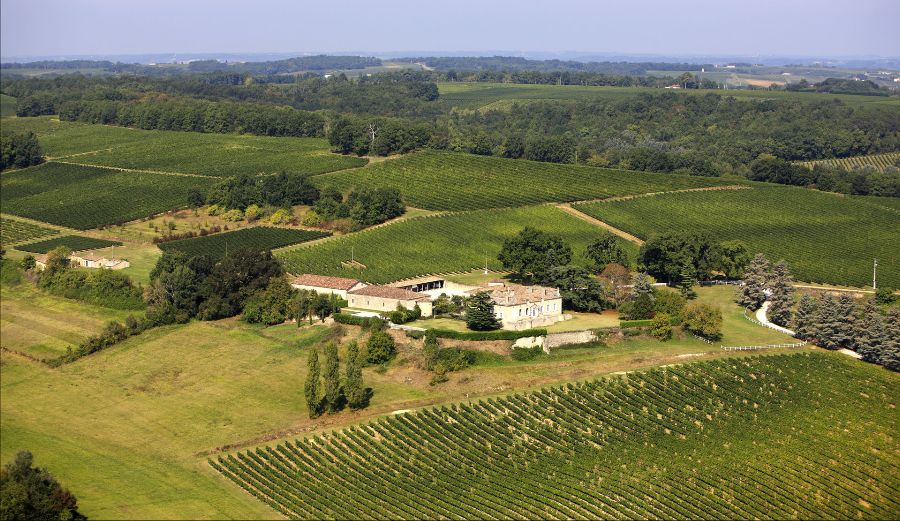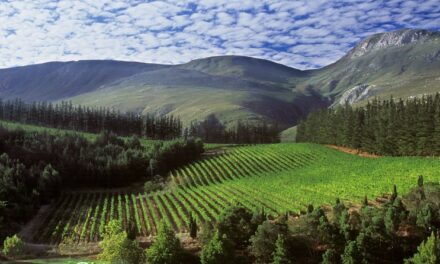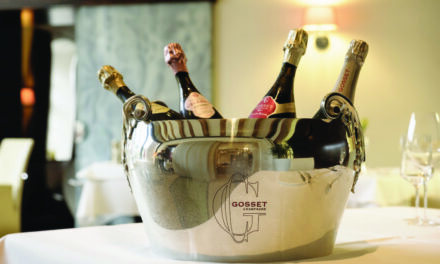In curating our portfolio here at The Vine, we strive to balance wineries representative of the classic styles of the world alongside those exploring new frontiers. We are so happy to introduce you to Château Rouquette, from arguably the most famous region in France. Bordeaux represents the largest winegrowing area in the country, encompassing 120,000Ha and comprising some 60 sub appellations, producing around 15% of France’s wine.
The château and eponymous estate is located in Entre-Deux-Mers (Between two tides), situated between the tidal rivers of the Garonne & Dordogne, underneath the watchful eye of the hill of Saint-Émilion, where they also own a small 4Ha vineyard. Chateau Rouquette’s conversion to organics is underway, with projected certification in 2024.
 2021 La Tour aux Palombes Bordeaux Blanc
2021 La Tour aux Palombes Bordeaux Blanc
“The Tower of the Pigeons”. Made from Sauvignon Gris, a pink-skinned mutation of Sauvignon Blanc that is a rarity in Bordeaux, accounting for less than 1% of plantings. Fermented with indigenous yeast and matured on lees in stainless steel, this wine has bright, spicy aromas of lemon confit, green apple, and tropical fruit leading to a palate reminiscent of toasted spice, fresh peach, creamy pear, and beeswax.
Retail $23.95 / btl
2018 Cuvée Lugrana Bordeaux Supérieur
The Supérieur designation implies a wine elevated from the standard of the basic regional appellation, requiring higher ripeness levels, higher density plantings and lower yields. This is a cuvée of Merlot, Cabernet Franc & Cabernet Sauvignon fermented with indigenous yeast and aged for 36 months in stainless steel. A fruit forward wine with aromas of black fruit, spice and violet. The palate is medium bodied, combining black cherry, licorice and dried herb with soft, youthful tannin.
Retail $23.95 / btl
2018 Château Pontet-l’Eglise Saint-Émilion Grand Cru
Much like Bordeaux Supérieur, the Grand Cru designation refers to an elevated quality level within the Saint-Émilion appellation that requires higher ripeness levels, lower yields and longer aging periods. A 4Ha plot of low yielding vines planted in 1956, this blend of Merlot and Cabernet Sauvignon undergoes an extended, spontaneous fermentation before 3 years maturation in a mixture of stainless steel and barrels. The nose gives aromas of red cherry and blackcurrant with a whiff of graphite, followed by dark red cherry, doris plum and black tea on the palate.
Retail $49.95 / btl
Click HERE to order!
Wines are sold in cases of 12 bottles unless otherwise indicated. Delivery charges may apply. Some quantities are limited, and are sold on a first-come, first-served basis.
About Château Rouquette
The Domain, one of the oldest in the Entre Deux Mers region, can trace its history back to 1346 when the original castle was built. During the Hundred Years war (1337-1453) which was a series of armed conflicts between the English Royal House of Plantagenet and the French Royal House of Valois, the castle was destroyed. In the 17th century it was rebuilt and at the time the entire estate of over 1,000HA was one of the most important in the region. Over time, and with the French succession rules, the estate has decreased considerably and is now just over 82HA in size with 40HA given over to vines, and the remainder to forest and grassland.
Entre Deux Mers is located east of Bordeaux and 20km south of Saint Émilion. It has a temperate, oceanic climate, with undulating hills, situated between 2 large bodies of water, the Garonne, and the Dordogne, hence its name. The terroir has a vast diversity of reliefs, exposures, and soils. The Domain is perched in Roquette, meaning small rock, and as the name may suggest, it benefits from excellent drainage due to the clay and stony soils. The vineyards are planted mainly to red grapes (nearly 85%) of which merlot is the dominant variety (approx. 2/3 of all the red grapes) with cabernet sauvignon, cabernet franc and malbec and primarily sauvignon blanc with small amounts of sauvignon gris, muscadelle and semillon making up the white grapes.
Today, the estate is owned by Christophe Widcoq and together with his team they have developed a passion and respect for the environment. The estate is isolated, surrounded by forests. Effective from 2021, the domain has started its conversion to organics with the goal of being recognized by Bureau Veritas in France by 2024. Some of the elements introduced to achieve this certification include the removal of all plastic tags in the vineyards, natural fertilisers of cow manure and chicken droppings, planting fava beans and grasses between the rows of vines and the use of agroforestry, of all which is encouraging the local wildlife, native trees and grasses, birds, and insects. Many of these elements are reflected on the labels with images of wood pigeons, doves, swallows, and hares all displayed. The domain was recently expanded with the purchase of a small estate, 4HA in size, situated in the grand cru Saint Émilion appellation. The same rigorous environmental passion is displayed at Chateau Pontet-L’Eglise.
The winery has some modern touches that allow for greater emphasis on quality. Harvesting is done mechanically but with a very modern and very selective sorting tool on the machine which provides extremely ‘clean’ grapes. The grapes are then brought into a large spacious winery for further sorting, accepting only the very best. A variety of sizes of stainless-steel tanks ranging from 50 – 250HL are used for the vinification process and allow for individual parcels to be kept separate. A temperature controlled, underground barrel room receives the wine for aging in French oak (225L Bordeaux barrels) or concrete tanks where appropriate. This is a small property and winery where attention to detail is of supreme importance, with 150,000 bottles produced annually.







